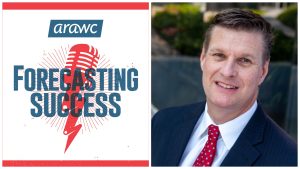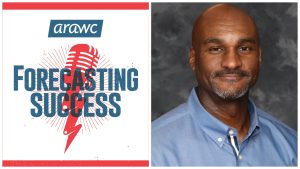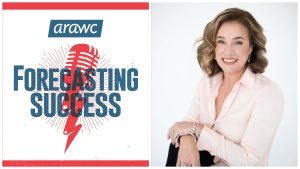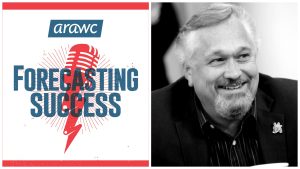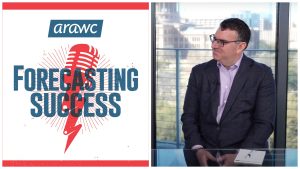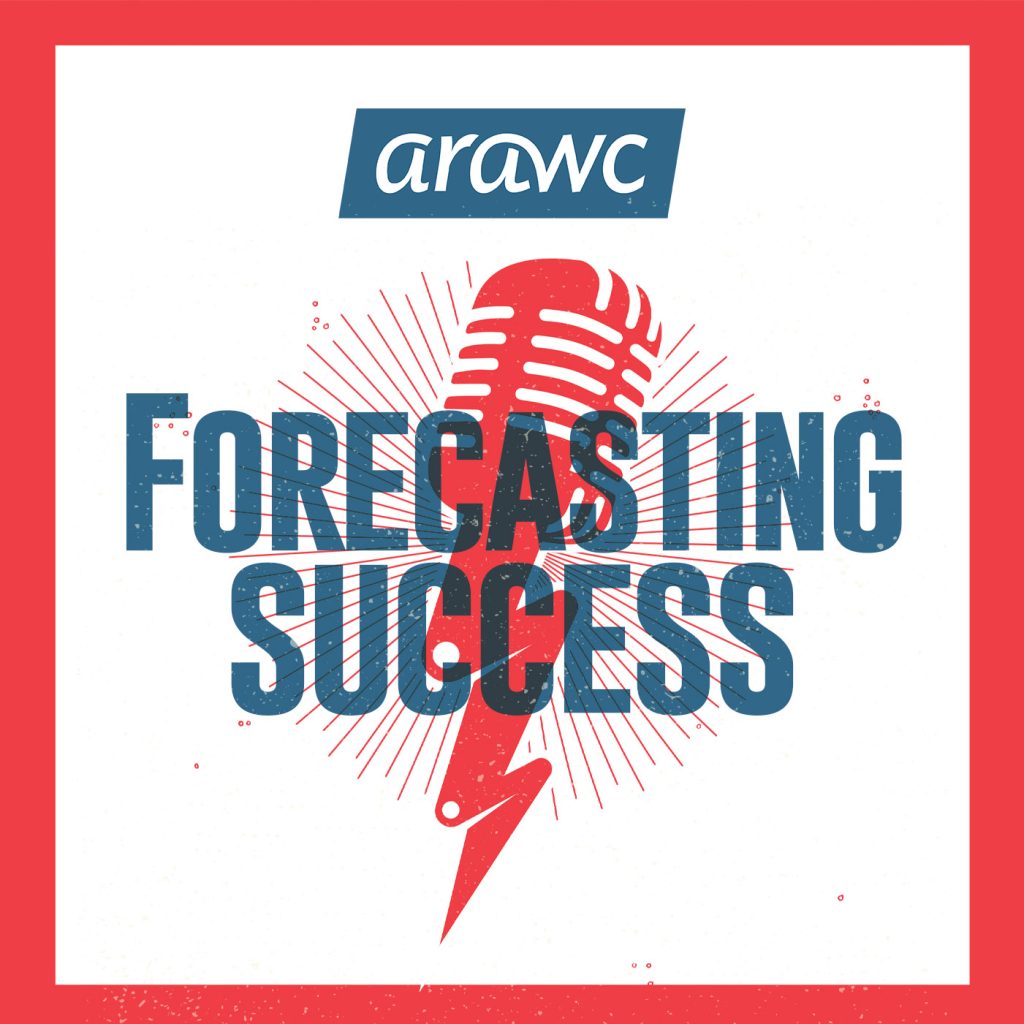Ryan Brannan (00:00:06) Good afternoon. This is Ryan Brannan, your host of Forecasting Success, here with another episode of the podcast. And we’re excited to have you join us and hear what we’re going to talk about today. As you know, Forecasting Success. We try to find innovative ideas and folks that are putting these things into action to better improve the market as a whole. And I’d also like to briefly thank our title sponsor, ARAWC, for the opportunity to be able to put this together. As always, we’re really excited. We have a great guest today. I want to introduce Brian Allen, who is going to be joining me as we talk about his time and his work and what he’s accomplished and what he’s working on and where it’s going and all those things. So, Brian, hello and thanks for joining us.
Brian Allen (00:00:56) Thanks, Ryan. Appreciate it. Happy to be here.
Ryan Brannan (00:00:59) For those who are watching and listening to the podcast, can you let them know who you are and how we got.
Brian Allen (00:01:08) So, my name is Brian Allen. I’m the Vice President of government affairs for Mitchell International and Enlyte. That’s my main job, I guess. I’m also a co-founder of Optimized Outcome Solutions, which is a patient education program designed to help injured workers better understand their role in their own recovery. So we help educate and coach them through their recovery to make sure that they know kind of mess up all the good work the doctors do for.
Ryan Brannan (00:01:38) So I’ve known you for a long time now. Brian is one of these road warriors that goes all over the country doing great work on many things. And I’ve known him, I think, going back to when I was the commissioner in the state of Texas. And Brian’s had several roles before then and after then. And one of the things that makes him so great at government relations is that he used to be in government, if you want to briefly mention that.
Brian Allen (00:02:07) Yeah. So I spent a few years as a legislator in Utah, in the Utah house, and while there worked on insurance issues, obviously, because that was my background, but also was active with education reform issues and transportation issues was a big part of my role. And it was also part of a committee that helped oversee a loan that the state had made to the Olympics, which was an interesting thing to be involved in the Olympics when they came to Salt Lake.
Ryan Brannan (00:02:39) Very neat. And I mentioned he’s always on the road, and we were able to catch up with him here in San Antonio. You might notice we don’t have the Texas State capitol in the background for this one, but we do have a welcome sign with, it looks like a windmill. We’re in San Antonio for the SAWCA, which is the Southern Association of Workers Comp Administrators, although it goes beyond that, I think on this one we have states, Wisconsin, even Alaska is included. So this is one of the better events for networking with those in other states. And I’m still proud to call a lot of these commissioners and folks that are here friends, and that includes Brian. Brian was nice enough to sit down with us again. We thank you. So when I met you, I believe you were working at Optum and now Mitchell.
Brian Allen (00:03:32) Yeah, it was probably met before Optum purchased. So same thing. Pharmacy care for injured workers. Mitchell is much bigger than that. They have everything from first report of injury all the way through to the end of the claim at the settlement level. But the area I focus on mostly is the provision of pharmacy care for injured workers. So that’s the big part of my role.
Ryan Brannan (00:03:58) So how did you get into this field?
Brian Allen (00:04:02) It was kind of by accident, honestly. I was a coo of a large insurance agency. It was owned by a bank. And in Utah, the banks and the credit unions got in a big fight over taxation. I think that’s happened in every state. And the bank president, this was after I’d gotten out of the legislature, had come to me and asked me if I still had friends at the legislature. And my comment to him was, well, I probably have all my enemies. I don’t know how many friends are left. So I went up and kind of nosed around the Capitol. A lot of the people I served with were still there, and it was only a couple of years after I got out. So they loaned me to the bankers association to lobby on this bill on behalf of the banks, and I agreed with the bill. I fundamentally agreed that the banks had the right position on that bill, and so I was amenable to doing that. So I went and lobbied with the bankers association for a session, and we were very successful. And they ended up offering me a contract for halftime. That was as much as my annual salary at the bank. So I thought, well, I’m going to go into the lobbying business. That sounded like it was fun. And we were in the process of acquiring another large agency, and the people of that agency wanted my job, so it just made sense to let them have it right. And so the bank was very good to me. They were super gracious about the transition. They really soft landed me. And then I picked up this client that was called working Rx. And so when I became a contract lobbyist, I started looking for other work to do. And this working Rx was, I guess they considered a third party biller for pharmacies. So they worked for the pharmacies and build workers comp bills because workers comp is one of those challenging things for pharmacies to do, because when an injured worker shows up, they don’t know who the insurance company is. Sometimes they’re not even really sure who their employer is because sometimes they’re working for a subcontractor, but the person who actually holds the worker’s comp insurance is the general contractor. So there’s always all these things they don’t know. And the pharmacies aren’t equipped to chase all that information down, so they use these third party fillers to do that for them. So this group hired me to just do an inventory of state laws, figure out where they couldn’t do business and what they had to do in various states to do business. So I went through all the states and did that inventory, and after a while they asked me to start advocating, and I hadn’t advocated in a lot of states outside of Utah, so I had to learn how to get licensed in all these states and do different things and really just kind of just sort of grew from that. And then that company was bought by another third party, so, which was called third party solutions, or TPS. So I thought, well, I’m a consultant. I’ll probably be one of the first guys to go, because usually in an acquisition, the consultants just get jettisoned for cost savings. And what happened is they cut my contract back. And so I thought, okay, that’s fine. So I continued to work for them. And then after about six months, they came back to me and said, I guess we really need you. We didn’t realize how much we needed you. So we want to increase your contract, but we also want to add some things to it. So I ended up having a bigger contract in the end. And then I started speaking at conferences and was getting out quite a bit. And then they came to me and said, well, you know, you’re out speaking at these conferences, but we’re not getting the benefit of our brand attached to you, so we want to brand you to the company. I says, well, I’d have to be an employee to do that. And they said, well, we’ll hire you. So I worked at an arrangement where they hired me, and I was still able to do my other consulting stuff, and it worked out pretty good. I mean, I had this kind of best of both worlds thing, and they were very good to work with and I really enjoyed them. Then they bought a company called Progressive Medical and then they bought a company called PMSI, which was another, which was a workers comp PBM. So they’re both workers comp PBMs and they sort of put all that stuff together under the Helios banner. And then after a couple of years, Optum bought Helios. And I worked for Optum for a bad year. Optum is a very large company. I struggled. I’m not a big company guy. I like agility. I like to be able to make decisions quickly. I like to be able to move quickly. And big companies don’t do that. So it didn’t really fit my personality. I stayed a year to help them with the transition and I left. And then I got picked up by Mitchell, which is a smaller company and a lot more agile. And that was five and a half, almost six and a half years ago. And they’ve been great, been a great company to work with. Now, Mitchell’s rebranding, as you know, it’s a constant change in this industry. And Mitchell’s Enlyte brand is really because they’ve purchased a lot of different entities and they’re trying to bring them all under one umbrella, which is brilliant. I mean, you have to do that. It makes sense to do that because you want to have a single kind of name and brand out in the marketplace. But in that work, I’ve had an opportunity to talk to a lot of people about the challenges in the industry. And one of the challenges know a lot of times injured workers get hurt. They should get better and they don’t. And nobody can quite figure out why that is. And I’m really grateful that ARAWC’s your sponsor because they are committed to improving. Right. They’re committed to good outcomes. The people that work with ARAWC are committed to good outcomes. I’ve spoken at the ARAWC conference in the past and they are an organization in Texas that’s really committed to doing good. And it’s funny because we piloted our program here in Texas with the non subscribers. Oh, I didn’t know that. Yeah. And so over the last couple of years, we worked the group here and it’s been very successful. But one of the things I figured out is that everybody in the system is trained on what they should do and how they should behave and how the system should work. Except the injured worker.
Ryan Brannan (00:10:08) Right.
Brian Allen (00:10:08) Injured workers are for the most part, and I don’t say this in a mean way or a condescending way at all, they’re clueless about how to help themselves get well. And that’s true for everybody. I mean, that’s true in the commercial health market. It’s true in the government health market. Most people, no one takes surgery one on one in school, right? We don’t get that training. So we don’t know how do we prepare for surgery? How do we recover from surgery? How do we recover from major injury? And add to that the complexity of navigating the workers comp system, and it’s challenging. So I started asking around about, well, what do people do for injured workers? And I realized that no one educates them. No one is training or coaching injured workers on how to help themselves get well. So I started this company called Optimize Outcome Solutions, which is designed to help injured workers learn how to get well. And we have guest educators, and it’s a peer to peer coaching program. So all of the founders or three co founders, all of us have been through a major surgery or injury and survived. I’ve had two knee replacements. I had cancer surgery. One of my partners broke his back in a car accident, was work comp related, and another one broke his back. Not work comp related, but he fell off a mountain. He fell through down a 300 foot glacier and broke his back. So we’ve all had experience. And then our celebrity coaches, we have people like Bill Walton, who’s been through a former NBA player who’s been through 38 orthopedic surgeries. So he talks about those experiences and reports having a coach to get through that. And then we have a guy named Nathan Corey, who’s a former MMA fighter who broke his back in the ring and rehabbed and went back in the ring and won his middleweight title back. After his broken back surgery. He’s got metal implants in his back. So he talks about his experience. And so we think that really helps injured workers understand that here are people who have been there and done that, who are helping me get there and do that. And as Bill Walton likes to say, everyone needs a coach, someone who’s been where they want to go to help them get there. And that’s what we try to do. We just try to help. So we educate injured workers on getting their head in the game, getting their mindset in the right place so that they’re positive instead of negative. We help them understand that their nutrition and here’s foods that you should eat to help your body heal. Most people don’t realize that when you go get anesthesia, your microbiomes are messed up for a year after surgery, if you don’t do things to prep that you can have long term effects. And there are people who go through surgery who actually, their intestinal system shuts down because they didn’t properly prepare. So we try to help people eat the right kinds of food. And it’s amazing because not only does that help them through their injury, but for many, it becomes a lifestyle change that helps them through the rest of their life. And the mindset is the same thing. If you get an injured worker who’s intentionally focused on a positive attitude about their recovery, they’re going to have a positive attitude about their employer when they go back to work because this employer helped me get a positive attitude about my recovery. It’s this weird kind of thing that sort of trails out even beyond the injury.
Ryan Brannan (00:13:11) No, I’m really glad that you went all the way straight there because your experience is so varied in knowledge and just depth across a broad spectrum of the industry. And so your unique background, understanding of how this works saw an issue that I think everyone was aware of, but maybe not aware of to the point where they could pinpoint it, to figure out how to make an improvement in the system and to go back just momentarily. I’m glad that you mentioned ArOC, because they are employers that go out of their way to care about injured workers. And at the end of the day, it’s all about the worker. But you’re right, the worker doesn’t have that knowledge. And giving them that knowledge and that headspace is so important. In fact, this doesn’t really have anything to do with anything except for the fact that it came to my mind. I just recently watched an old Kevin Costner movie where he’s a baseball player called for love of the game, and he’s a pitcher who injures his hand, and he’s trying to rehab it to get back. And his trainer says, if you get back and Kevin Costner gets very upset because the trainer said if and kicked him out and said, you have to get your mind right. It’s not if I get back, it’s.
Brian Allen (00:14:30) When I get back that’s so important.
Ryan Brannan (00:14:32) And you’ve pinpointed that. And it immediately drew a movie clip to me. But in reality, it’s the same. And these workers have to get the headspace right and to hear it from other athletes, not just movie stars playing athletes, but actual athletes who have gone through it and these other celebrity coaches. That’s fantastic. So sorry to interrupt.
Brian Allen (00:14:54) Oh, no.
Ryan Brannan (00:14:55) Well, I just wanted to make sure that our viewers really pinpointed on the.
Brian Allen (00:15:00) Importance of what you’re doing. It’s funny that you bring up ARAWC because my initial experience with ARAWC was during the time when we were doing research for the program. And so the ARAWC philosophy really informed what we were trying to do. How do we focus on improving outcomes? And what’s the one area of outcome that really hasn’t had a lot of focus? And it’s the injured worker. The injured worker is a wild card. Now there are some people that are going to get hurt and they’ll get better no matter what. They’re just the kind of people that are just going to get better. There are other people who get hurt who never want to get better. They’re going to be the malingerers, the guys that are milking the system. They don’t care. They don’t want to get better. There’s a whole bunch of people in the middle that do want to get better. They just don’t know how. And our job is to train them on how to get better so that we can improve that outcome. And it’s ultimately to the benefit of the employer. It because the employer gets an employee back to work more quickly, they come back with a better mindset. And I will tell you the other thing is that it builds an affinity in the mind of the age of worker for their employer because we tell them all throughout the program, your employer is paying for this because they want you to get well. They care about you as a human being and they’re trying to get you back to work. And I will tell you that in our pilot that we did in Texas, and it was, I don’t remember the exact number of people, but it’s maybe 40 or so. Not a single one of them got an attorney because they felt cared about. And when we do our post program surveys, almost to a fault, almost every one of them says the thing they like the most about the program is that I felt like someone actually cared about me and getting better.
Ryan Brannan (00:16:42) And that’s amazing. So how long has it been since you first created this brainchild and turned it into action? And what kind of results have you seen so far?
Brian Allen (00:16:53) So we started the pilot a little over two years ago, probably two and a half years ago now. And as reported by the group that we worked with, the results, they said for similarly situated patients. So they were looking at people who are similarly situated. They said that our results are anywhere from ten to 30% better than they’re seeing for people with people who are not in the program and no attorney, which we didn’t even know or even think about measuring that. They measured that. That was something they told us. We didn’t even think about looking at that. That really wasn’t our concern. Our concern was just getting the injured worker better and well. And now we since have brought on some new organizations that are using the program, and they’re still early. We wanted to have a successful pilot be able to really demonstrate the effectiveness of the program because I didn’t want to roll something out that didn’t work. If I’m going to promote something, I want to make sure it actually does work. And I didn’t want to sell snake oil. But we have a program that we’re very confident in that it works well. And we were actually fortunate enough that last August Bill Walton was the keynote speaker at WCI in Florida, the workers conference, and he was super well received. And I will tell you, it generated a lot of interest for us. But what Bill did was able to tell the message to the industry that injured workers need a coach. And he talked about his experience as a professional athlete and the resources that they threw at him as an asset to get him back to the basketball court in a winning games. We should feel the same way about our injured workers. They’re an asset. We’ve invested time and money in them, training them and helping them become proficient in their work. We should want them back because we’ve already spent that money training them. You don’t want that to go away. And so maybe they’re not exactly a professional athlete, but they’re professional at what they do for you as an employer. So how do we get them back to work more quickly, and how do we make them get through this work comp experience with a better attitude about where they are in their own head and how they feel about their employer and how they feel about the process in general.
Ryan Brannan (00:19:05) I love this because one theme throughout every episode of this podcast and everyone you talk to in this industry is helping the injured worker, getting them the care they need, and getting them back on the job as quickly as possible. It’s everybody’s goal. You’ve not only seen that as a goal, but you’ve isolated some of the reasons why they’re not getting the care they need or getting back to the court or to their job as quickly as possible and have actively figuring out what it takes to do that, where the roadblocks are, how to get through those, and created this pilot program with quantifiable, measurable success. And of course, to your point, with getting the headspace right and getting that mentality right. You may not be tracking the lawyers, but I guarantee you the employers are. And I think you’ve pinpointed on it that the reason they’re not trying to sue or to go after their employer is because they believe through this program that their employer cares. The fact that you able to isolate a program to get the injured employee to understand that everybody’s pulling together is really incredible. I think you first brought this to me, or told me you were starting this up, working on it. It’s probably been a year, year and a half, maybe even a little more than that now, but I thought it was a great idea then. So I’m very happy that you’re coming onto the podcast today to talk about it and to show success. So, given the fact that you’ve had measurable success in the pilot program, and you said, obviously Bill Walton talking at WCI generated interest, where do you see it going from here?
Brian Allen (00:20:56) Well, I think with the day that we have and the demonstrable success that we’ve had, we just want to grow it out for us. I say this and sort of tongue in cheek, but it’s affordable. I mean, our retail rate on it is $249 a month. It usually runs three to six months. So it’s not expensive. We’re not trying to make a bunch of money on it. It’s pretty thin margins for us. It’s kind of mission work. I’m an older guy that’s been around the industry for a while, and at some point in time, I’m going to, you know, hang up the chaps and call it a day. Right. I’m going to say I’m done.
Ryan Brannan (00:21:39) Hopefully not anytime soon.
Brian Allen (00:21:40) We need not anytime soon. But the fact of the matter is, for me, this is kind of like mission work. It’s an industry I love. It’s an industry I care about. I think it’s an important industry in our ecosystem between workers and employers. I think it’s critical, and I want to help it do better. I want to help it be better. And the reality of it is, we put a lot of time and effort in research. Before we launched the program, we had a PhD RDN who helped build a meal plan for us that’s unique to our program. She’s one of the internationally leading researchers on enhanced recovery after surgery. The nutritional piece of that, which is an emerging science. She gave us a list of ingredients. These are all the foods that help your body heal. We took those ingredients to a celebrity french chef that we knew in LA who built a four week meal plan for us out of those ingredients. And they actually taste really good. I used them. I was the first person to really.
Ryan Brannan (00:22:42) Do it when I remember this cancer. Tell the audience about this.
Brian Allen (00:22:45) So I was the first person to use it after my cancer surgery. And I lost 40 pounds, if you can believe that, going through this prep thing. And I wasn’t the intent. I just wanted to get my body ready for surgery, and I really wanted to beat the cancer. Right. And that was five and a half years ago when I had the diagnosis and I had the surgery in June of this year, I hit my five year mark cancer free. And the doctor says, you’re going to have to find something else to kill you, because this isn’t going to. It’s not coming back. Which was great, but I was in such good shape when I had that cancer surgery. So I had my surgery on a Friday morning. I checked out of the hospital on Saturday, and I’d been eating all this food. I’d been walking, trying to prep for the surgery. The day after surgery, I put my catheter bag in a target sack, and I went for a mile walk. By the end of that first week, I was up to 3 miles a day. Never used pain meds after surgery, not a single opioid. Now fast forward that. This last year, I’ve had two knee replacements. I used the program again, lost ten more pounds. I still got a few more I could lose. And the reality of it is now, obviously, with a knee replacement, I wasn’t up walking a mile the day after surgery, but I recovered quickly at six weeks after both knees, and I didn’t do them at the same time. I did them separately, but at the six week mark with both knees, my doctor said, you’re cleared to go skiing, mountain biking, whatever you feel comfortable doing.
Brian Allen (00:24:27) Yeah. And the funny thing is that even with my knee surgery, I only used for both surgeries other than the day of surgery, where they made me take one before I went home. I took an opioid before I went home. I only used three opioid pills per surgery. Wow. And I didn’t need them because first of all, I think I was very. My head was in the right place. But that nutritional preparation and really getting your microbiome in the right place, I felt fantastic.
Ryan Brannan (00:24:52) And that nutritional element is also part of the program.
Brian Allen (00:24:55) That’s part of the program. We have a very holistic approach, four week meal plan. So it’s all about. So we focus on mindset, on nutrition, on physical activity, and on rest. And the funny thing about physical activity is nobody really thinks about that a lot. But I just saw a study a week ago. This isn’t our study. It was somebody else’s. But there was a study just released and I’m trying to get my hands on the full study, but I saw a synopsis of an abstract, and it says that if a patient can get 7500 steps a day for the three or four weeks preceding surgery, their surgery outcomes are anywhere from ten to 20% better. Wow. We’ve been telling people that all for four years now, right? This is what you need. As part of our research, we figured out the physical activity was critical to get your body. So before I had my knee surgery, I knew when they cut my leg off and reattached it, it was going to do something to the muscles in my leg. So I worked really hard to strengthen them. So we help people understand. If you’re going in now, look, it hurt because my knees hurt. I mean, my knees hurt like crazy. I will tell you that the day of surgery, after I walk came out of and every subsequent day since then, my knees have always felt better than they did the day before surgery. That’s how bad it was. I mean, they were in bad shape. So we help people understand that even if it’s uncomfortable, as long as you’re not doing damage to your body and within the constraints of what the doctor said you can do. We never ask them to do anything the doctor tells them they shouldn’t do. But physical therapists, doctors tell me you can do these things. All we do is help them do it. We just remind them to do it. We’re kind of like that angel on their shoulder saying, hey, you need to do this. You need to do this. And because there’s a person on the other end of that phone calling them and talking to them, that’s coaching them, there’s a level of commitment because I’m talking to a human being. We tried to do with an app early on, and the app didn’t work because nobody cares. Nobody’s committed to an app, right? Because it’s an electronic device. But when you’re talking to another human being, there’s a level of commitment there that’s different. And we think that’s kind of the magic piece of our program, is that there’s actually a human being on the other end that vulnerably cares about me as a person, and I want to do what they’re asking me to do because they care about.
Ryan Brannan (00:27:02) Yeah, clearly you’ve put a lot of effort and time and thought into this and even put your own body through it. And now you can show these results with the pilot program and the experience that you’re gaining. And I personally just think it’s an incredible idea, something that not anybody in this marketplace could have thought of, but certainly somebody who’s as committed and passionate with the experience and knowledge and everything that you bring to the table. And so I was very excited to talk to you about this today and very much looking forward to seeing where it’s going. I think this is a phenomenal idea, and I really think it’s going to change the marketplace forever. We just have to get it up and get there.
Brian Allen (00:27:50) I hope so. I mean, that’s our hope is that, I think our hope is that we really change health care and reengage people in their own health and especially reengage people in their own recovery. We’ve got to get past the notion that if I have this procedure, I have this pill, that all my problems are solved. We have to take personal responsibility for how we move forward in our health. In our personal health, and also how do we move forward in our recovery after an injury or surgery.
Ryan Brannan (00:28:16) Fantastic. Brian, thank you very much for joining us.
Brian Allen (00:28:20) Thanks, Ryan. I appreciate being here.
Ryan Brannan (00:28:21) Always great to see you, and I’m glad to hear about the success that you’re having. And to everybody watching and listening, please reach out if you want more information. I’m happy to put you in touch with Brian. He’s doing excellent work. I’m proud to call him a friend. And I want to thank you all for joining us on this episode of Forecasting Success. Have a great day.

